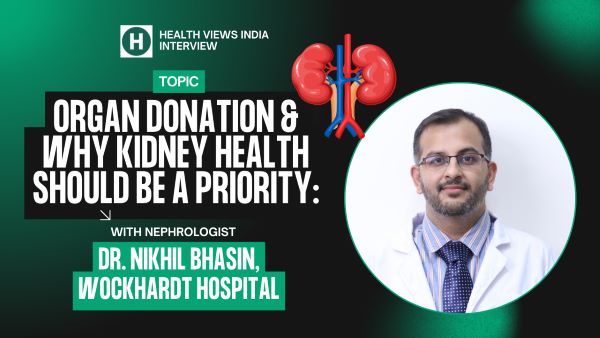Organ donation is a gift of life. Yet, in India, the rate of organ donation remains much lower than the need, leaving thousands of patients waiting for life-saving transplants. Among all organs, the kidneys are the most commonly transplanted — and the most commonly affected by lifestyle-related diseases. To shed light on the importance of organ donation and why kidney health should be taken as seriously as the heart, liver, or brain, HealthViews India spoke to Dr. Nikhil Bhasin, a leading Nephrologist at Wockhardt Hospital.
Q1: Dr. Nikhil Bhasin, why is organ donation so important in today’s healthcare scenario?
Dr. Bhasin: Organ donation is critical because it directly saves lives. Every year, thousands of patients die waiting for a transplant due to a shortage of donors. In India, awareness is low, and myths often prevent people from pledging their organs. A single donor can save up to eight lives and improve the quality of life for many more through tissue donation. For kidneys in particular, we see a huge gap between demand and availability — making it essential to encourage both living and deceased donations.
Q2: Why do kidneys require such special attention compared to other organs?
Dr. Bhasin: The kidneys silently perform vital functions — filtering waste, balancing fluids, and regulating blood pressure. Unfortunately, kidney disease often develops without symptoms until it’s quite advanced. People tend to prioritize heart and brain health but forget that without well-functioning kidneys, the entire body suffers. With rising rates of diabetes, hypertension, and obesity, chronic kidney disease (CKD) is becoming a silent epidemic.
Q3: What are the most common causes of kidney failure that you see in your practice?
Dr. Bhasin: The leading causes are uncontrolled diabetes and high blood pressure. These conditions damage the tiny blood vessels in the kidneys over time. Other causes include recurrent urinary tract infections, kidney stones, prolonged use of painkillers, and certain autoimmune diseases. Lifestyle factors such as high-salt diets, low water intake, and sedentary habits also contribute significantly.
Q4: How can people take better care of their kidneys on a daily basis?
- Stay hydrated but don’t overdo it — 2 to 3 liters of water a day is adequate for most people.
- Control blood sugar and blood pressure through diet, exercise, and medication if prescribed.
- Avoid excessive salt and processed foods.
- Limit painkiller use unless medically necessary.
- Get regular kidney function tests if you have diabetes, hypertension, or a family history of kidney disease.
Q5: Could you explain the process of kidney donation? Is it safe for a donor?
Dr. Bhasin: In living kidney donation, one healthy kidney is removed and transplanted into the recipient. The donor’s remaining kidney compensates for the loss, and most donors lead completely normal lives after recovery. In deceased donation, kidneys are retrieved from a brain-dead donor with the consent of the family. Both processes are done under strict medical protocols to ensure safety and success.
Q6: What myths about organ donation do you encounter most often?
Myth: Doctors won’t try to save me if I’m an organ donor.
Truth: Saving the patient’s life is always the top priority. Organ donation is only considered after brain death is confirmed by multiple independent doctors.
Myth: Organ donation disfigures the body.
Truth: The retrieval process is done with dignity, and the body is returned to the family in a respectful manner.
Myth: Age or health problems automatically disqualify you from donating.
Truth: Many people, even in their 70s or with certain health conditions, can donate organs or tissues.
Also Read: Artificial Organs and Implants: A New Era in Organ Transplants
Q7: What final message as a Nephrologist would you give to our readers about kidney health and organ donation?
Dr. Bhasin: Think of kidney health as a long-term investment. A balanced lifestyle today can prevent years of dialysis or the need for a transplant later. As for organ donation — it’s the greatest legacy you can leave behind. Sign up as an organ donor, talk to your family about your decision, and inspire others to do the same. By doing so, you could give someone the most precious gift — a second chance at life.
Kidney health often gets overshadowed by more “talked-about” organs, but it is just as vital for survival. Let’s work together to spread awareness, take preventive measures, and break myths around organ donation. Because one decision can change multiple lives.

About Dr. Nikhil Bhasin, Nephrologist at Wockhardt Hospitals, Mumbai
Dr. Nikhil Bhasin is a renowned Nephrologist at Wockhardt Hospitals, Mumbai, specializing in kidney health and transplantation. With years of expertise in nephrology (M.B.B.S, MD Internal Medicine (Gold Medalist) DM (Nephrology), DNB (Nephrology) Fellow of American Society of Nephrology (FASN) Clinical Fellow, University of Toronto Fellowship in Glomerular Disease (GlomCon, USA), he actively advocates for organ donation and raises awareness about preventive kidney care. Dr. Bhasin is dedicated to offering advanced, patient-centered treatment to improve the quality of life for individuals with kidney disorders. Follow him on LinkedIn, or get your appointments here.




